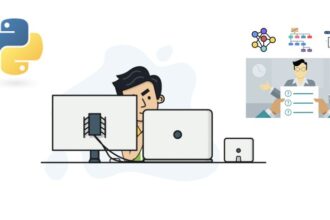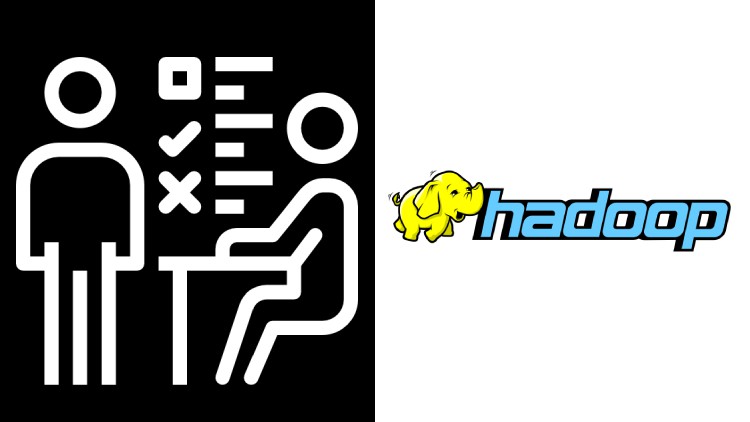What
You’ll Learn
You’ll Learn
- Mastery of Hadoop Fundamentals
- Advanced Hadoop Knowledge
- Practical Use of Hadoop Ecosystem Tools
- Effective Problem Solving and Interview Readiness
Requirements
- Basic Understanding of Data Concepts: While not mandatory
- having a basic understanding of data concepts can be beneficial. Familiarity with terms like databases
- data processing
- and data storage will help you grasp Hadoop concepts more easily.
- “Programming Knowledge (Optional): Although the course doesnt require programming expertise
- having some familiarity with programming concepts (e.g.
- Java
- Python) can be advantageous when working with Hadoop development aspects. However
- this is not a prerequisite
- and the course covers programming-related topics in a beginner-friendly manner.”
Description
Hadoop Interview Questions and Answers Preparation Practice Test | Freshers to Experienced
Embark on a journey to master Hadoop and big data interview questions with our meticulously designed practice test course. Whether you’re a budding data professional or an experienced Hadoop developer, this course is tailored to elevate your skills and prepare you for the most challenging interview scenarios. Dive into a wide array of topics, each packed with carefully crafted practice test questions that mirror real interview settings.
Our practice test course is divided into six exhaustive sections, each focusing on critical aspects of Hadoop, ensuring a comprehensive grasp of the technology.
-
Hadoop Fundamentals:
-
Begin with the basics, understanding Hadoop and its role in big data. Our practice tests cover the intricacies of the Hadoop Distributed File System (HDFS) and the MapReduce Framework.
-
Explore YARN Architecture, the backbone of resource management in Hadoop, and delve into various Hadoop Ecosystem Components.
-
Finally, grasp the essentials of Hadoop Cluster Configuration and Data Loading techniques, a crucial skill set for any Hadoop practitioner.
-
-
Advanced Hadoop Concepts:
-
Elevate your knowledge with advanced topics like High Availability, Fault Tolerance, and data serialization systems including Avro and Parquet.
-
Tackle the complexities of Hadoop Compression, Input/Output Formats, and Security, including Kerberos Integration.
-
The practice tests in this section will also cover Hadoop Administration Tasks and strategies to optimize Hadoop Cluster Performance.
-
-
Hadoop Ecosystem Tools:
-
Delve into tools like Apache Hive for data warehousing, Apache Pig for scripting, and Apache HBase for NoSQL database functionalities.
-
Master data transfer techniques using Apache Sqoop, and data collection/aggregation with Apache Flume.
-
Our questions on Apache Oozie will help you understand workflow scheduling for Hadoop jobs.
-
-
Data Processing and Analysis:
-
This section focuses on Data Ingestion tools and methodologies, comparing Batch vs Real-Time Processing.
-
Learn through practice questions about Data Transformation Techniques and SQL on Hadoop, including HiveQL and Impala.
-
The section culminates with tests on Data Analytics using Apache Spark and building Data Pipelines in Hadoop.
-
-
Hadoop Development and Programming:
-
Write and debug MapReduce Programs through our simulated interview questions.
-
Get a handle on integrating Hadoop with other languages and understand the nuances of the Hadoop Streaming API.
-
This section also includes best practices in Hadoop Development, crucial for any aspiring Hadoop developer.
-
-
Hadoop Deployment and Troubleshooting:
-
Understand the complexities of setting up and monitoring a Hadoop Cluster.
-
Our practice tests will guide you through troubleshooting common issues and delve into capacity planning.
-
Learn about Backup, Recovery, and Disaster Management, and get insights into Scaling and Tuning Hadoop Clusters.
-
We Update Questions Regularly:
To ensure that you stay ahead in the ever-evolving world of Hadoop, we are committed to updating our practice test questions regularly. Technology evolves, and so do the challenges in interviews. Our dedicated team of experts constantly reviews and updates the questions to keep them relevant and aligned with the latest industry trends. This means that you’ll always have access to the most current and valuable Hadoop interview questions, giving you a competitive edge in your job search.
Sample Practice Test Questions with Detailed Explanations:
To give you a taste of what to expect in this course, here are five sample practice test questions, each accompanied by detailed explanations:
Question 1:
Which Hadoop component is responsible for resource management and job scheduling in a Hadoop cluster?
A) HDFS
B) MapReduce
C) YARN
D) Pig
Explanation: YARN (Yet Another Resource Negotiator) is responsible for resource management and job scheduling in a Hadoop cluster. It separates the resource management and job scheduling functions, allowing for more efficient cluster utilization. HDFS (Hadoop Distributed File System) is the distributed file storage system, while MapReduce is the processing framework. Pig is a high-level scripting language used for data processing on Hadoop.
Question 2:
What is the primary function of the Hadoop Distributed File System (HDFS)?
A) Real-time data processing
B) Data storage
C) Data analysis
D) Job scheduling
Explanation: The primary function of HDFS is data storage. It is designed to store vast amounts of data across multiple machines in a distributed and fault-tolerant manner. While Hadoop is known for its data processing capabilities, HDFS is responsible for storing the data efficiently.
Question 3:
What is the purpose of a reducer in the MapReduce framework?
A) Data sorting
B) Data splitting
C) Data mapping
D) Data aggregation
Explanation: The purpose of a reducer in the MapReduce framework is data aggregation. Reducers take the output of the mappers, which consists of key-value pairs, and perform aggregation operations on the data, such as summing values or calculating averages. Reducers help in summarizing and processing the mapped data.
Question 4:
Which Hadoop ecosystem tool is commonly used for querying and analyzing data using SQL-like queries?
A) Apache Hive
B) Apache Pig
C) Apache HBase
D) Apache Oozie
Explanation: Apache Hive is commonly used for querying and analyzing data using SQL-like queries in the Hadoop ecosystem. It provides a high-level language called HiveQL that allows users to write queries to retrieve and analyze data stored in HDFS.
Question 5:
What is the purpose of Apache Sqoop in Hadoop?
A) Data transfer between Hadoop and relational databases
B) Real-time data processing
C) Data aggregation in HDFS
D) Resource management in YARN
Explanation: The primary purpose of Apache Sqoop in Hadoop is to facilitate data transfer between Hadoop and relational databases. It allows users to import data from relational databases into HDFS and export data from HDFS to relational databases, enabling seamless data integration between the two environments.
These sample questions and explanations are just a glimpse of the in-depth learning experience you’ll receive in this course. Each topic is accompanied by similar practice test questions with detailed explanations to ensure you not only know the answers but also understand the underlying concepts.
Enroll Now:
Join our comprehensive Hadoop practice test course today and take the first step towards acing your Hadoop interviews. With our extensive practice tests, you’re not just preparing for interviews; you’re setting the foundation for a successful career in the world of big data. Enroll now and transform your understanding and mastery of Hadoop!
Who this course is for:
- “Aspiring Data Professionals: If youre new to the field of big data and aspire to build a career in data analytics
- data engineering
- or any Hadoop-related role
- this course provides the foundational knowledge and interview preparation you need to kickstart your career.”
- “Current Hadoop Practitioners: If youre already working with Hadoop but want to deepen your understanding
- fine-tune your skills
- and prepare for more advanced roles
- this course covers advanced topics and best practices to elevate your expertise.”
- “Job Seekers and Interviewees: If youre actively seeking job opportunities in the field of big data and Hadoop
- this course equips you with the knowledge and confidence to tackle interviews successfully. The realistic practice test questions mirror real interview scenarios.”
- Students and Graduates: For students studying computer science
- data science
- or related fields
- this course offers a practical supplement to your academic curriculum. It bridges the gap between theory and real-world Hadoop applications
- enhancing your employability.
- “Professionals Switching Careers: If youre considering a career switch to the field of big data or Hadoop technology
- this course serves as a valuable introduction and interview preparation resource to help you transition successfully.”
- “Anyone Interested in Big Data: Even if youre simply curious about the world of big data and want to explore Hadoop technology
- this course provides an accessible and informative introduction.”






